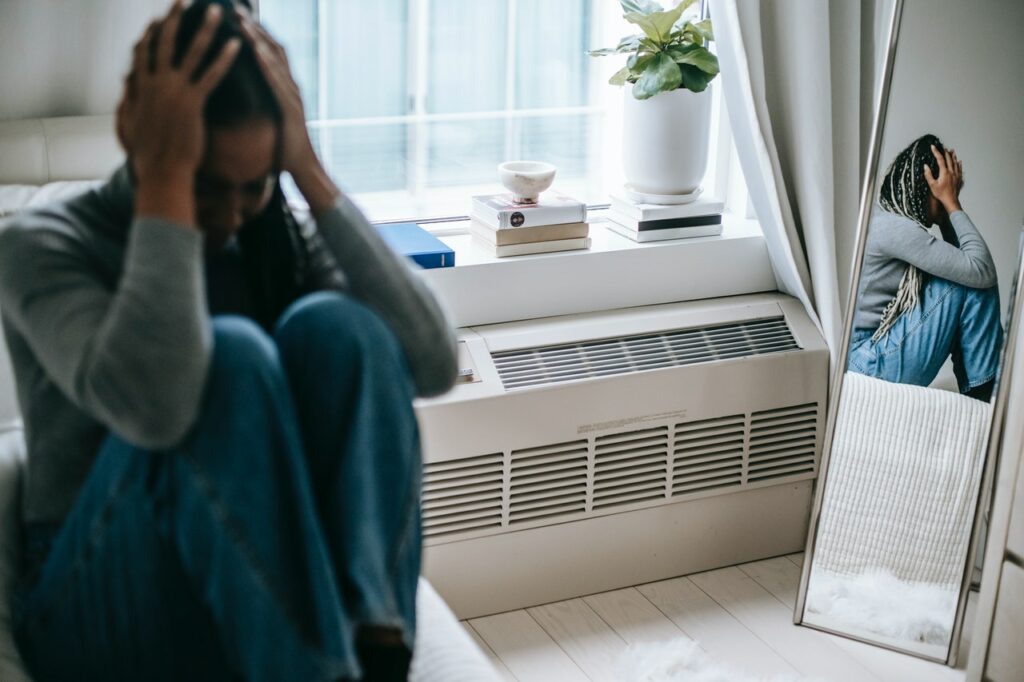Have you ever been in a situation where you wanted to spend time with your loved ones, but you chose something else over them for your own good? Or you decided to get a better item for yourself than your friends or siblings?
What we are saying here is:
Have you ever done anything while thinking about yourself only, and later on, you looked back with a weird feeling?
That feeling, my friend, is called guilt.
It’s a feeling people typically have after doing something wrong, intentionally or unintentionally. A person’s sense of guilt usually relates to their moral code.
Now you know what your awful feeling was all about. But sadly, guilt doesn’t end here, and it’s probably not as simple as you think.
Feeling guilty for a longer period can be harmful to your own well being. As a matter of fact, you might end up in a never-ending struggle with recurring self-judgment related to what happened and your fear of others finding out.
Read on to learn about the physical symptoms of guilt and how to cope with this feeling.
Why Do We Feel Guilty?
There are numerous reasons why you might have feelings of guilt. It could be because of a person, situation, or event.
Some people feel guilty about their behaviour, habit, or flaws. Others may feel guilty for not doing something when they should have, for example, not being there for a friend when they needed you.
Many things can cause feelings of guilt. In summary, feeling guilty about something often involves:
- Keeping distance between yourself and people you have hurt
- Expecting punishment
- Focusing on past actions or deeds and recognising that their effects are not reversible
Are There Any Physical Symptoms Of Guilt?
Yes, there are! The physical symptoms that occur due to guilt may include:
- Head pain
- Insomnia
- Tearfulness
- Stomach pain
- Muscle tension
- Digestive issues
So, it is highly recommended to look for ways to resolve and stop feeling guilty as soon as possible to keep yourself healthy!
14 Effective Techniques To Stop Feeling Guilty
Considering how feelings of guilt can affect your emotional and physical well being, here are a few tips to help you stop feeling guilty.
1. Journal Your Guilt
Generally, masking your emotions won’t help you in the long run. Admit these unpleasant feelings of guilt and journal them. It will help to observe and note the pattern of your guilt behaviour, making you able to either change or fix a habit causing you guilt.
2. Root Cause Of Your Guilt
Recognising the source will help you pinpoint the reasons for which you’re feeling guilty. Because at times, you might face situations where you’ll feel guilty for a reason which doesn’t have to do too much with you.
So, it will let you know that whether you are even right to feel guilty about a particular action performed in a specific situation – such as, you are doing a much better job than your friends, etc.
3. Apologise Sincerely
Take the difficult step of letting the victim know of your actions that you are sincerely sorry for what you have done to them. Also, ask for forgiveness and show remorse. Let them know that you regret your actions deeply, and you will avoid repeating them in the future.
The victim might not forgive you right away, but it’ll help both of you move on and heal over time. And if you are lucky enough, then eventually, they’ll forgive you.
4. Make Amends
What’s even better after the sincere apology is: to change the habits that led you to feel guilty. Apologise by writing a letter or speak to the person directly to convey your apology face-to-face. Show your sincerity not only through words but your actions too!
Show them that you want to be forgiven, and you do feel guilty. Change your habits to show your honest regret about the situation others faced because of you.
5. Learn From The Past
Learn about your own guilty behaviour from the past actions that you had performed under certain circumstances. Note the reasons or triggers from it. And then, try your level best to do things differently to avoid making the same mistake again.
6. Practice Gratitude
You might have helped others on their instant call on many occasions, but you have a hard time asking others for help for yourself.
Remember, not everyone has to face all the struggles of life alone. So, it’s okay to ask for help. Have the courage to voice for yourself when you sincerely need help to get things done.
7. Self-Compassion
Self-punishing yourself, in any case, is definitely not a good idea! Being a human being, everyone makes mistakes and messes up from time to time. You just have to learn to objectify the situation, accept, and forgive yourself. Don’t be too critical and judgmental about yourself as it won’t undo the action or improve the situation anyway.
8. Talk With Genuine People
It is not easy to say out loud about your mistakes to others. But this is the only way to help yourself get perspective from others on our guilty situation.
Genuine people around you will show emotional support and share their sincere opinions. However, if you don’t open up to your trusted people, it can lead you to loneliness and isolation while disrupting your healing process.
9. Quit The Blame Game
Feeling guilty and blaming others won’t do any good to you and others as well. Instead, it can worsen the situation, leading it to lose the people around you.
If something goes wrong, stay calm and accept the situation. And no matter how bad the situation is, learn from it and move on.
10. Recognise Your Good Qualities
Occasionally, write about your qualities that make you feel good and happy about yourself. Just go through it when you are feeling down or guilty about something.
Being happy with yourself can help you to avoid negative talk and unwanted emotions as well. This approach can do wonders in fighting against that inner worst most critic.
11. Guilt Can Also Help You Out
At times, it’s a good thing! At least you see the problem and worry about it. Doing something is better than doing nothing at all. According to the research findings of Francis Flynn, published in Harvard Business Review, revealed that:
“People who are prone to guilt tend to work harder and perform better than people who are not guilt-prone and are perceived to be more capable leaders.”
So, even guilt can make you productive when used wisely.
12. Learn To Say “NO”
You must practice it at least once a day to make yourself realise that you don’t have to feel guilty every time you want to refuse something, but you end up agreeing to it.
Learn to refuse politely and reasonably for the work you feel uncomfortable, unpleasant, or burdensome.
13. Stop Dwelling On Your Guilt
Instead of rewriting each scenario inside your head, utilise the situation to figure out your mistakes and plan for the future.
As “What ifs?” won’t help bring back time and make the situation happen again. So, you must focus and prepare for your future actions and bring positive change to them.
14. Consult With A Therapist
Severe guilt doesn’t always go away easily. Over time, guilt (intrusive thoughts, depression, trauma or abuse) can affect relationships and add stress to your daily life.
In that case, a therapist can help you identify and address the causes of guilt, making you resilient to the situation.
The Bottom Line
Guilt is a feeling that occurs after you do something wrong, either intentionally or unintentionally. If it stays unresolved, then you should practise specific techniques to let go of it.
Strengthen your resilience and make better choices in the future. However, a therapist can help you out better if you’ve been suffering from guilt for a long time, and it’s not getting any better over time.




Recent Comments